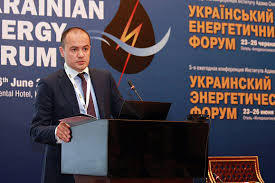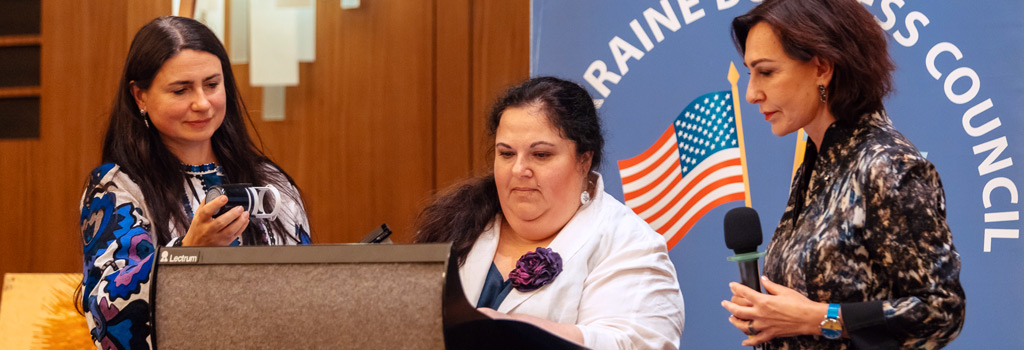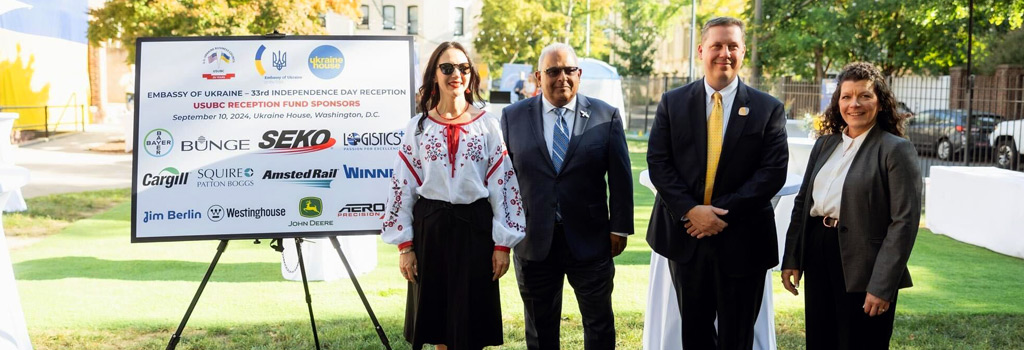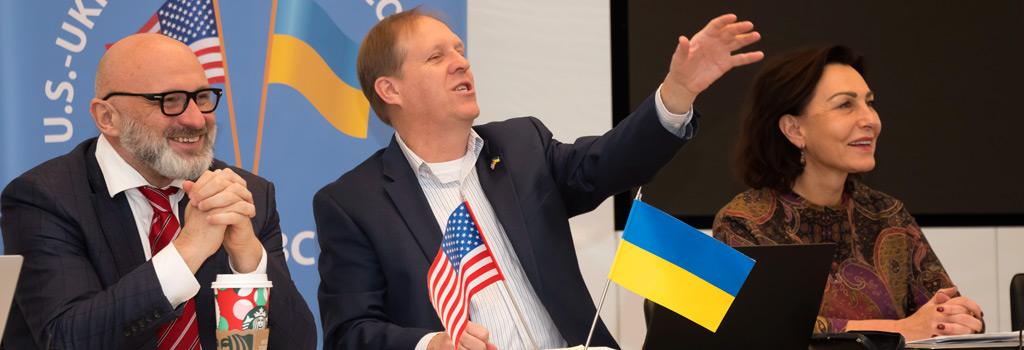Featured Galleries USUBC COLLECTION OF OVER 160 UKRAINE HISTORIC NEWS PHOTOGRAPHS 1918-1997
 Holodomor Posters
Holodomor Posters

DTEK CEO Maxim Timchenko:Chief Executive Officer of DTEK: the European Commission Expects that Ukraine Passes a Law on the Electricity Market and the Regulator

Thursday, June 2, 2016
DTEK is a member of USUBC
Chief Executive Officer of DTEK: the European Commission Expects that Ukraine Passes a Law on the Electricity Market and the Regulator
18:55, 2 June 2016
Question: Who initiated the meeting? What was the reason for this meeting? What are the main topics that were discussed there? What are the results of the meeting?
Response: That was not the first meeting with Mr Šefčovič, and similar meetings take place on a relatively regular basis, regardless of the current agenda. For instance, in September 2015, I met with Mr Arias Cañete, European Commissioner for Climate Action and Energy. In addition, DTEK is a member of Еuracoal and Eurelectric, the European industry associations, and actively participates in their work.
The Ukrainian energy system is an important component of the energy safety of the entire European continent; therefore, a regular exchange of opinions on the situation and future of the Ukrainian energy system is useful both for large strategic market players, such as DTEK, and for our European partners.
During the meeting, we discussed a relatively wide range of issues: starting from the gas market functioning to the renewable energy development and energy efficiency enhancement. We even discussed the so called “smart city” development.
All of this proves that everything happening in Ukraine is of interest and that there is a willingness to help our country build the energy system of a new, European quality.
Question: Other than the traditional topics of the gas purchase and transport, which developments happening in the Ukrainian energy system interest the European Commission most of all? Were the issues related to the electricity industry discussed in more detail?
Response: Currently, the development and implementation of a new model of the electricity market is one of the key priorities for the European Commission. In addition, the Commission closely follows the situation with a draft law on the regulator. It is important for the entire Ukrainian energy industry that the respective legislative framework is passed and starts operating as soon as possible. If these laws are passed by the end of June, I am convinced that by the end of the year we will be able to achieve a progress at the electricity market as significant as the one at the gas market.
I have a feeling that understanding and certainty that the reform process is irreversible and will not slow down are very important for our Brussels colleagues.
In addition, one should bear in mind that the market reform is a condition for granting of macro-financial assistance to Ukraine. It means two more tranches amounting to EUR 600 million each. Needless to say that Ukraine itself, in the first place, needs the transparent and clear tariff setting system and a free electricity market.
In addition, we discussed the issue of reliability of the operation of the thermal generation in the coming autumn- winter period, and stability of anthracite supplies from the uncontrolled territory. Currently, the situation is complicated by the absence of mechanisms for the salary pay-outs to the Ukrainian Railways’ employees who are there and ensure the railway operation at the uncontrolled territory. If the railway operation issue is solved, then the Ukraine’s thermal generation will be provided with the required anthracite reserves.
Our European partners are very much concerned with the traditional topic of gas supplies and Ukraine’s energy safety. My main message remains the same: in the nearest future, Ukraine will be able to fully satisfy its gas needs out of its own production. The main conditions for this include the transparent rules equal for all players at the gas market, the team professionalism, and investments using the modern technologies. In the last two and half years, DTEK was able to increase the gas production so that it almost tripled. By the end of this year, we plan to produce more than 1.5 billion cubic meters of gas. I am persuaded that once the above conditions are fulfilled Ukraine will be able to produce domestic gas to fully satisfy its needs in five years.
Question: Was any feedback of the European Commission to the agenda of the Ministry of Energy, expectations as to the work of the new Minister voiced? What should be a key priority for the nearest future?
Response: More details will be known once the Vice President of the European Commission and the respective Minister meet in person. From my side, it would not be correct to comment on something before that. A progress in the gas market reform is an unquestioningly positive signal. As to expectations, they relate to, in the first place, the electricity market reform.
We must show our capacity to perform the undertaken obligations, and we must create transparent game rules at our energy market. This will be an extremely important signal for international financial institutions, Western energy companies, and financial investors.
In the first place, Ukraine needs this itself. Drawing on the phrase of Mr Šefčovič: "We need good stories coming from Ukraine". It is difficult not to agree to this – we all need good stories!
Question: How do Mr Šefčovič and the European Commission evaluate the progress in the work relating to the new Memorandum of Understanding on co-operation in the field of energy?
Response: Currently, we are speaking not just about an update of the document that would determine the main directions for the cooperation in the energy industry in the last ten years. The new memorandum shall formalise the status of the strategic cooperation and, what was specifically emphasised, in the same format as the five main directions on which the Energy Union strategy is based: energy safety, integrated electricity market, energy efficiency, environmental protection, research and innovations.
In this context, we, in the nearest future, need to update the Ukraine’s Energy Strategy and reflect in it the present day facts of life noted in the country’s energy balance, provide strategic landmarks for all market players and include it into the Europe’s new energy system model.
Question: Currently, many experts are discussing a new coal pricing methodology. What is the European Commission view on such initiative of the National Commission for State Regulation in Energy and Utilities?
Response: We spoke about reforms in the energy sphere in general, not going deep into details of certain methodology or rules. I can only add that the feedback of some commentators of this topic does not take into account an actual state of affairs in the industry and the discussion is being held, to a large extent, in the political, not economic dimension.
Firstly, an approval of methodology or formulae linked to the international market indices is an unquestioningly correct decision. Previously, it was being done “manually”, not transparently that provided many opportunities for administrative or political interference and abuse. Today, it is difficult to argue against the credibility of the European coal price index (API2), which is used for practically all deals on energy coal supplies to Europe.
Secondly, the fact that there is now a methodology is a real step in the direction of the electricity market reform. Starting from 2013, when the law on the electricity market on the basis of the European principles was passed, we did not move in its implementation at all. It was decided to pass a new law and it continues for two years by now, then another two years are needed for its implementation. All this time, there is no predictability at the energy market whatsoever, and we live in the constant search for truth – in coal, gas prices, in tariffs. The entire country has become a hostage in such search, while populists earn short term dividends by destructing the economy’s ruins.
As you may be aware, for the almost two years we are in a complicated dialogue with the regulator on many issues; we meet in courts relatively frequently – and that is not normal for the key economy sector. We have always demanded just one thing – rules of operation that would be market-based and equal for all. Coal pricing methodology means rules. Whether such rules are good or not may be a topic for an endless discussion; but the main thing is that such rules are based on market indices and the impact of “political advisability” on the pricing is being reduced significantly.
In addition, slogans of alleged experts as to DTEK’s excess profitability due to the transition to the new wholesale market price formula sound strange. This is an example of unprofessional and politically driven discussion. In the last two years, owing to many external and internal factors, including a short-sighted policy of the industry’s ministry, we were left with the ruined coal industry, abnormal level of accident risk at nuclear plants and thermal generation in the bankruptcy state. In order to restore this wreckage, we need predictability and sound investment policy, and not the regime of survival from month to month. In the next 20 years perspective, Ukraine will not be able to give up either its own coal or thermal generation. In the last 10 years, DTEK invested into these industries more than U.S.$ 5 billion, that provided a certain safety buffer. As of today, such safety buffer is exhausted and neither we nor any other investor will invest into the Ukrainian energy system without stable market rules. Therefore, the new methodology gives us a certain hope that the situation will change.
We do not feel an economic effect from this methodology yet, and the increase in our tariff by 20-30% as announced by certain experts has not happened yet: in April the tariff was 116 kopiykas and in May it decreased to 106 kopiykas; on average for five months it amounted to 100 kopiykas, that is by 10% higher than for the same period of the last year given the inflation rate of 50%. At this, the debt of Energorynok just to DTEK increased by more than UAH 1 billion in 2016. Given such figures, let the outrage mongers teach us and other market players how it is possible to operate normally, provide hundreds of thousands of workplaces and invest into the future of the Ukrainian energy system.
Scrutiny and public control are necessary and important. But criticising should be constructive and professional and should offer alternative solutions that would work in the long-term perspective.
Question: But in the last few weeks the price for DTEK’s Eurobonds went up significantly that is being linked precisely to a new methodology and an increase in the price for the electricity generated by DTEK and other thermal power plants. How would you comment on this information?
Response: Such information is a striking example of the situation when the discussion is being held not in the economic but in political perspective and facts are being misrepresented with a political purpose. An increase in price quotations of Ukrainian companies’ securities traded at the external markets – that is the best that could be out there for Ukraine these days! That is a powerful positive signal for international partners, investors, and for the international capital market in general. And anyone wishing a recover of the economy and the country in general should be glad about it, instead of coming up with various theories.
As to DTEK, I believe that the first features of the industrial production recovery in Ukraine and, respectively, an increase in the electricity consumption were the reason for the price quotations going up. We restored normal volumes of the coal production in the first quarter. In addition, at the end of April we renewed coupon payments.
Further, a decision of Eurobond holders to provide to the company six months for the credit portfolio restructuring settlement came into force. On 18 May 2016, Moody's confirmed DTEK and DTEK FINANCE PLC's corporate ratings at the level of "Ca". We maintain a constructive dialogue with lenders and I hope that in the near future we will be able to sign a global plan for the debt obligations restructuring.

















